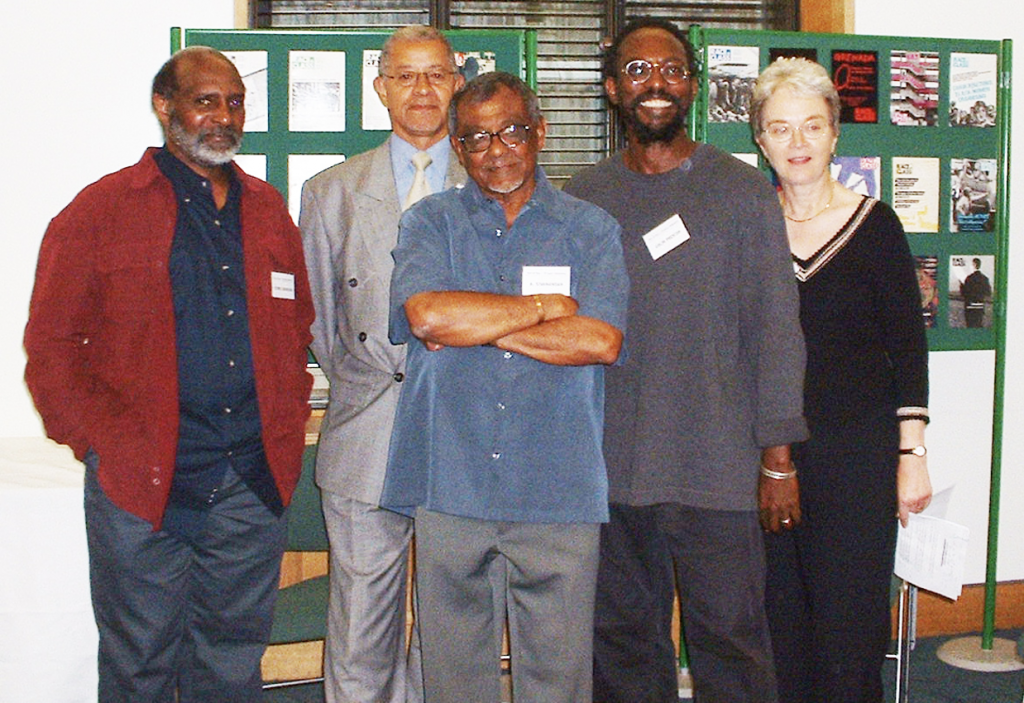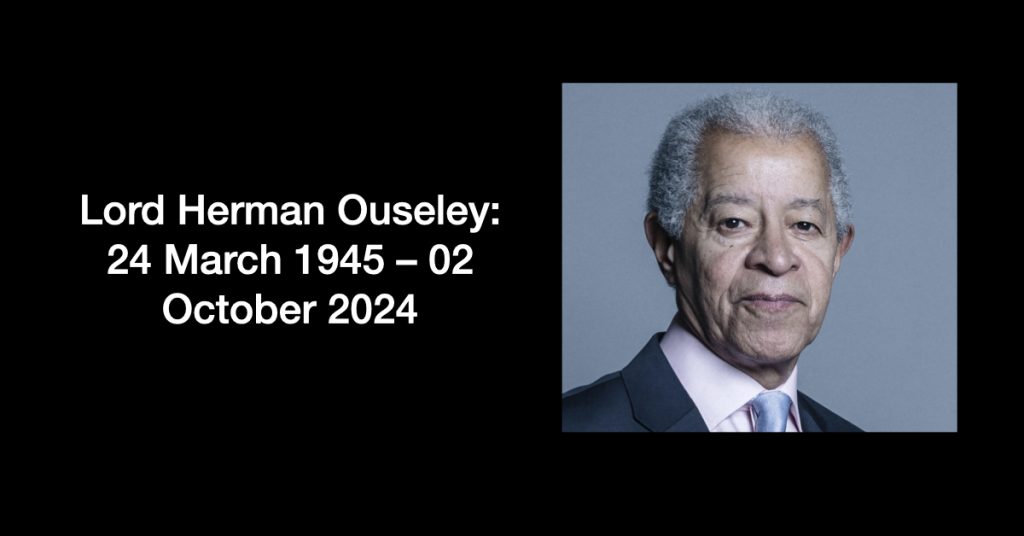Professor Gus John and Jenny Bourne of the Institute of Race Relations, with which Herman was associated for over thirty years, pay tribute to Herman as an indomitable defender of rights, champion of racial justice and, always his own man.
From Professor Gus John:
Deeply saddened at the news of the death of my friend and comrade, Herman Ouseley.
We were fellow travellers on a very long journey and he was a giant of a public servant and an indomitable defender of rights and a champion of equity. His contribution to ensuring that Black and Global Majority (BGM) people received the protection of the state from unlawful discrimination and from the denial of equal opportunities for advancement through education, employment, housing and in the delivery of services and goods was stellar.
From senior leadership positions in the Greater London Council, to his position as chief executive of Lambeth Borough Council and then the Inner London Education Authority, to the chairmanship of the Commission for Racial Equality (CRE), to the House of Lords as a cross-bencher, Herman championed the rights of BGM people. As a champion of racial equality and social justice, he had no less appetite for coupling race and class and confronting class oppression and the neglect of white working-class communities.
When I became director of education and leisure services in Hackney, seeking to improve education and especially schooling outcomes in one of the poorest boroughs in the country, Herman’s unstinting support as chair of the CRE was invaluable. Later, we were both advisers to Jack Straw and in that capacity worked with civil servants on the Race Relations (Amendment) Act 2000. Herman was justifiably frustrated at just how little enthusiasm the government had for ensuring that as a regulator/watchdog, the CRE was resourced to a level that would enable it to demand evidence of compliance with the legislation. Once that became evident to public bodies, most adopted a minimalist approach to implementing the legislation and complying with the CRE’s stipulations for corrective action. That is why the government had no evidence on which to base its decision to collapse race, disability and sex discrimination legislation into a single equality act.
As founder of ‘Kick Racism Out of Football’, Herman fought many battles with the Football Association and particularly with premier league clubs, all of which displayed a disgraceful level of tolerance for the racial abuse black players routinely suffered and were resisting calls to take responsibility for rooting out racism. Today, not only do black footballers openly acknowledge their debt to Herman Ouseley and his uncompromising leadership, they demonstrate more and more that they have the courage and determination to take individual and collective action to defend their rights and demand that all stakeholders clean up the game.
I had a head start on him for 13 days only and I looked forward to us breaking bread together in a very special way next March.
Walk good, dear comrade, and may your Ascended Ancestors welcome you with fanfare.

From Jenny Bourne:
Herman Ouseley died on 2 October aged 79 and much has (rightly) been made in the media of his unique contribution to tackling racism in football and his glowing career as the first black person to reach the pinnacle of municipal management: running the London Borough of Lambeth, the Inner London Education Authority and then the national Commission for Racial Equality. But we remember him for something slightly other – being his own man and always true to his roots in Guyana and Peckham via Catford College.
This was a man who did not just speak truth to power. He had power and spoke truth.
I remember distinctly when in 1981 the GLC advertised for a kind of ‘race tsar’. We speculated as to which established scholar would have credentials for such a job. But we read the times quite wrongly. The person who became London’s Principal Race Officer and head of its Ethnic Minorities Unit was someone from another stream completely – not even a graduate, but someone schooled in local government. It was the burgeoning of town hall anti-racism. And we at the IRR, as others, looked at his appointment askance. How could a bureaucrat fight racism and in an institution which was part of the problem and not the solution?
Herman answered the sceptics by simply ‘exhausting the limits of the possible’ if not sometimes pushing on into the unthinkable. It was rumoured that when a neo-Nazi extremist came to protest at the GLC building, Herman had to be restrained from personally running down to show her out. And whispered questions reached us from inside the Home Office when plans were afoot to amalgamate equality bodies, ‘was Herman Ouseley always so bloody intransigent?’ When an Asian teenager was left in a coma from a brutal racist attack and community groups mounted a vigil outside the hospital, Herman was by his bedside – not the expected place of a civil servant.
This was a man of spectacular integrity; with a moral compass that shaped all his decision-making. And it was no mean feat to maintain that, as he trod so measuredly between bureaucracy, party politics and nationalist ethnicisms. Herman was his own man – not tied to blocs or interested in securing favours. But he was consciously keeping himself grounded. When there were profound decisions to be made, he had his touchstones, one of whom was Sivanandan. (Theirs was a friendship-cum-comradeship of mutual appreciation – and support of Manchester United.)
And Herman was, as the tributes now attest, the lodestar for so many. Yet he was not following in anyone’s footsteps. He had to plough his own furrow and in so doing was opening up the terrain for others. He felt the responsibility of having reached the top of his game, and spent many, many years just responding to individual discriminations and local injustices, advising groups, taking on inquiries, opening up meetings rooms in the Lords for community campaigning groups.
That is what lived experience is about.


Rip and Power, Herman Ousely was a mentor to me and helped me join the GLC aptec scheme as a vulnerable youngster living in YMCA croydon. Years on i became safety and health manager . A great man, fatherly, soft spoken, kind Titan of Equality and Justice. RiPP GNia now poet.
Rightly Herman has received fine obituaries as witnessed above. But for many working in London we knew well the huge importance he played in all aspects of our lives but particularly in relation to race and we knew his willingness to support and guide whenever he was asked.
For all of us lovers of football, both fans as well as players, his determined and steadfast work to eradicate racism out of football was unquestioned. It is essential that his work is maintained at all levels of the game.
He will be remembered with huge affection.
Lord Ouseley was a trail blazer for Black Africans, Black African Caribbeans and people of colour working in public service particularly local government given his stellar career rising to the position of Chief Executive at Lambeth Council and the CRE. His work in fighting racial equality, and social justice in public service and in Sports with his flagship initiative ‘Kick it out’ is unrivaled and has set the pace of those working and challenging the injustices those disadvantaged face in society. My heartfelt condolences to his family and friends and may his memory be a blessing to us all.